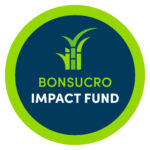28th March 2023
To mark World Water Day 2023, we invited Raízen to tell us about water challenges in Brazil and one of their initiatives to better manage water resources and build farmers’ resilience.

What are the main water challenges in your region of Brazil?
The efficiency of sugarcane production directly relies upon the climate. In recent years, adverse conditions have impacted production, as well as the productivity of the Brazilian sugar-energy sector.
Brazil’s centre-south region, which accounts for around 90% of the Brazilian sugarcane harvest, according to data from the Sugarcane Technology Center (CTC), was one of the most affected regions. The state of São Paulo, in the west region, specifically, was hard hit in March and April 2021, when it recorded the driest period in a century. Precipitation was 67% lower than the historical average (source: Centro de Tecnologia Canavieira). The situation harmed producers and caused financial impacts on communities in the region.
How are you addressing these issues?
In this context, we needed to think about solutions to mitigate the consequences of the drought. One of the most traditional methods is irrigation, but it is costly and often unfeasible for producers.
Raízen, through Pulse – our Innovation Hub –, and Arable – an agricultural intelligence startup –, co-created the project “Monitoring network for the efficient use of water and pesticides in the production of sugarcane”.
We aim to promote the rational use of resources and application of technology for monitoring crops and weather conditions in sugarcane production. At first, the focus of the project will be the macro-region of Araçatuba, in the western region of São Paulo, where 67.7% of the country’s sugarcane production is concentrated, according to the Companhia Nacional de Abastecimento.
Can you tell us more about the project?
We are currently planning for field activities. The monitoring of climate and crop conditions will be carried out through Arable’s crop monitoring solution, which involves an agrometeorological station. Installed in the farms, the station captures more than 40 climate, soil and plant parameters.
The collected data will undergo an intelligence analysis that will allow to visualise data in the sugarcane fields and weather through a computer and mobile application. Producers will be able to use this information to make better management decisions at the right time, and optimise their use of water and inputs.
What impacts are you expecting to see?
We expect the projet will improve the management of crops and resources, such as making more appropriate use of agricultural inputs, identifying the ideal planting period and using water stress mitigation techniques.
We also want to contribute to the continuity of the economic activity of sugarcane producers in the region by reducing failures, losses and planting risks. And finally, we aim to support the local economy, by generating revenue from the production of raw materials for bioenergy, biofuels and food.
Our project is in line with the UN Sustainable Development Goals (SDGs), particularly SDG 6 – Ensure access to water and sanitation for all – and SDG 12 – Sustainable production and consumption.
________________________________
 The project “Monitoring network for the efficient use of water and pesticides in the production of sugarcane” is supported by the Bonsucro Impact Fund (BIF).
The project “Monitoring network for the efficient use of water and pesticides in the production of sugarcane” is supported by the Bonsucro Impact Fund (BIF).
Through the BIF, we allocate grants to innovative sustainability projects that address key issues in the sugarcane sector, such as water and GHG emissions.
We will be launching new calls for proposals in April 2023. Sign up to our bulletin to make sure you don’t miss out on the next funding opportunities.




